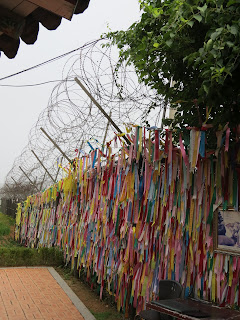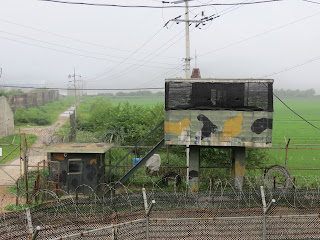 |
| Even the DMZ is a little cartoony. |
 |
| Military checkpoint on the bus. |
- Up until 1910, Korea (the entire Korean peninsula) was run by the series of dynasties, the most recent of which was the Joseon Dynasty.
- In 1910 Japan invaded and occupied Korea for the next 35 years. During this time, no one was allowed to speak Korean, all Koreans were issued Japanese birth certificates with Japanese names, and the history books were re-written to get rid of any trace of Korean history.
- When Japan lost WWII in 1945, they left Korea. The Soviet Union and the United States agreed to split Korea, with the Soviets having control of the north and the U.S. controlling the south.
- In 1950, the North invaded the South, in an effort to unify the countries. It was a proxy war, with the Soviet Union propping up the North and the U.S. propping up the South.
- In 1953 a ceasefire was signed, although the war has never officially ended. The ceasefire established the 38th parallel as the line between the two countries, and the DMZ was created.
- After the end of the Korean War the Soviet Union continued to support North Korea, and things were okay for them until the Soviet Union fell in the 80s. Since then things have become much worse for North Koreans. Starvation is a huge problem, and they have no contact with the outside world at all.
So, for the tour that we went on we went to a few different locations along the border. We saw two tunnels that the South Koreans have discovered, out of four that they found in the 70s. The North Koreans dug all these tunnels headed towards Seoul, with the goal of sneaking into South Korea and invading from here. The North Koreans seem to have a desire to reunify the countries, but they would want the entire peninsula to be communist, and under the rule of Kim Jong-un. But it's hard to tell what they really want. South Koreans, too, want to reunify, but that would put an enormous financial strain on their economy.
 |
| This is the Bridge to Freedom, where POWs were released. The ribbons are messages to family that is stuck on the other side of the border. |
Between the 1980s and 2000 there were some movements toward negotiation, reunification, and peace. There were family meetings, where families that were divided between North and South Korea after the war could meet each other. We saw some pictures of brothers who were seeing each other for the first time in fifty years. It was pretty powerful. Madeline Albright went to North Korea to have discussions, and there was a train built from South Korea to very close to North Korea. They wanted to build a train line that would go through North Korea and hook up with the Trans Siberian railroad, so it would be possible to get from South Korea to Europe by train. However, after George Bush came into office in 2000 and gave his Axis of Evil speech, we stopped speaking with North Korea, and there was no more progress made. One of the stops on the tour was this abandoned train station. You can get to there from other points in South Korea, but it doesn't go any further north, so now it serves as a tourist destination and a really nice bathroom.
One of the more interesting parts of the day was meeting a North Korean defector. He spent about 30 minutes answering our questions. He was a military doctor in North Korea, and they sent him to Germany in 2010 (I'm not sure why.) He was supposed to come back, but on his way home his train stopped in Moscow and he got out, found the United Nations office, and asked for amnesty. He had planned it in advance, but didn't tell his family, so he left his wife and kids there. We asked him what the hardest part about leaving was, and he said that now, in South Korea, he doesn't know anyone, doesn't have any family or feel like part of a community. Plus he can't practice medicine, because they don't recognize the training and experience he got in North Korea. In North Korea they are extremely isolated from the rest of the world. There's no internet, so media from other countries at all. They are told that their country is the best, most technologically-advanced country in the world. He said that in school they learn normal things, but also spend a long time learning about Kim Jong Il, Kim Il Sun, and the other leaders of the country.
We asked what the average North Koreans thinks/feels about the regime, and he said that about two-thirds used to support the regime, but now things are changing, and about two-thirds is against the regime. Since things were relatively good for them up until the Soviet Union fell, and that was less than 25 years ago, people know that things have changed. Even if they don't know exactly what's going on, they can be unsatisfied with the government that their standard of living has gone down so dramatically.
We asked how his reception in South Korea, by normal South Koreans, has been. He said that they tend to think that he's lazy, because he lived in a communist country and so he didn't have to work as hard. I've heard a lot of examples of South Koreans having negative attitudes about all foreigners. I wish he had been more accepted in South Korea.









